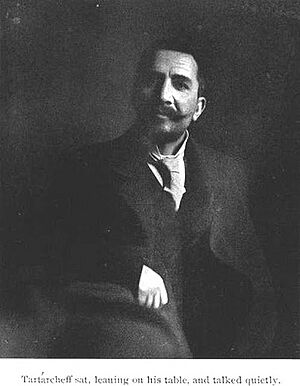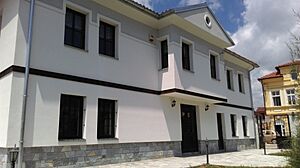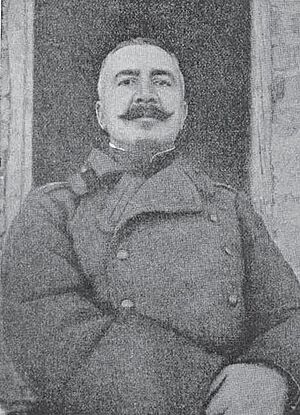Hristo Tatarchev facts for kids
Quick facts for kids
Voivode
Hristo Tatarchev
|
|
|---|---|

Hristo Tatarchev c. 1903
|
|
| Native name |
Христо Татарчев
|
| Born | 16 December 1869 Resen, Ottoman Empire |
| Died | 5 January 1952 (aged 82) Turin, Italy |
| Buried |
Sofia Central Cemetery
|
| Allegiance |
|
| Service/ |
|
| Battles/wars |
|
| Alma mater | University of Zurich |
| Other work | Physician, author, member of the Macedonian Federative Organization |
| Signature | |
Hristo Tatarchev (in Macedonian and Bulgarian: Христо Татарчев; born December 16, 1869 – died January 5, 1952) was a Macedonian Bulgarian doctor and a revolutionary. He was one of the people who helped create the Internal Macedonian Revolutionary Organization (IMRO). Tatarchev also wrote many articles about politics between the First and Second World War.
Contents
Life Story of Hristo Tatarchev
Hristo Tatarchev was born in 1869 in a town called Resen. At that time, Resen was part of the Ottoman Empire, which is now North Macedonia. His family was wealthy. His father, Nikola Tatarchev, was a successful merchant. His mother, Katerina, came from an important family.
Hristo started school in Resen. Later, he moved to Eastern Rumelia and studied in Bratsigovo (1882). He then went to a high school for boys in Plovdiv from 1883 to 1887. During this time, he joined a group of students who helped in the Unification of Bulgaria. He also took part in the Serbo-Bulgarian War in 1885.
Tatarchev was asked to leave school because he didn't follow the rules. He then moved to Romania to finish his high school education. After that, he studied medicine at the University of Zurich from 1887 to 1890. He finished his medical degree in Berlin in July 1892. In 1892, he moved to Thessaloniki and worked as a doctor at the local Bulgarian high school for boys.
Starting the IMRO
On October 23, 1893, Hristo Tatarchev became a founding member of the Internal Macedonian Revolutionary Organization (IMRO) in Thessaloniki. The next year, he was chosen to be the President of IMRO's Central Committee. He also attended the IMRO Congress in Thessaloniki in 1896.
Challenges and Continued Work
In early 1901, the Ottoman government arrested him. He was sent away to Bodrum Castle in Asia Minor for five years. Even though he was released on August 19, 1902, Tatarchev continued his work for change. In August 1902, he became a representative for IMRO in Sofia.
He met with Vladimir Lamsdorf, who was the Minister of Foreign Affairs for Russia. Tatarchev showed Lamsdorf IMRO's plan for changes in Macedonia. They discussed ideas that could lead to a successful revolt.
During the Ilinden–Preobrazhenie Uprising in 1903, Tatarchev helped lead the revolutionary efforts. After the uprising, he had some disagreements with other leaders. He did not take part in all IMRO activities at the Kyustendil Congress in March 1908. However, he was still appointed as an adviser.
After the Young Turk Revolution, he supported the Union of the Bulgarian Constitutional Clubs. In 1910, he was chosen as a reserve member of the Central Committee of IMRO. When Bulgaria joined the Balkan Wars and First World War, Tatarchev worked as a doctor for the army. After the wars, he helped start the Temporary representation of the former IMARO.
In 1920, he joined the Macedonian Federative Organization. Soon after, Tatarchev had to move to Italy. This was because he had disagreements with the IMRO leader at the time, Todor Alexandrov. In Italy, he wrote his memories and articles for newspapers like "Macedonia" and "Zarya." In his writings, he often criticized the Serbian and Yugoslavian governments.
Tatarchev became good friends with the new IMRO leader, Ivan Mihailov. He lived in his hometown of Resen for a short time during the Second World War. At that time, Macedonia was joined with Bulgaria (1941–1944). Later, he returned to Sofia. But in 1943, after bombings, he moved to Nova Zagora.
In 1944, the Germans offered him the chance to become President of the Independent State of Macedonia. However, he said no because the Red Army was entering Bulgaria. Bulgaria also told its troops to leave former Yugoslavia. After World War II, Tatarchev and his family faced difficulties from the new governments in Bulgaria and DFR Yugoslavia. So, Tatarchev moved back to Turin, Italy. He stayed in touch with Ivan Mihailov, who also moved to Italy. Hristo Tatarchev passed away on January 5, 1952.
Family Connections
Hristo Tatarchev's family members were also involved in the Macedonian revolutionary movement. His brother, Mihail, was an activist for IMRO. He was also the mayor of Resen during the Bulgarian occupation of Serbia in World War I, where he was killed.
His nephew, Asen Tatarchev, was also an IMRO activist between the two World Wars. In 1946, he was sentenced to death by the Yugoslav authorities. This was for working with the Bulgarian authorities during World War II. His sentence was later changed to life in prison.
Tatarchev’s grand nephew, Ivan Tatarchev, became Bulgaria’s top lawyer, the prosecutor general, after communism ended. He was also made an honorary chairman of the IMRO – Bulgarian National Movement in the 1990s.
Hristo Tatarchev married Sophia Logothetis. Her father was the Greek consul in Bitola.
Legacy and Remembrance
In North Macedonia, Hristo Tatarchev is seen as an ethnic Macedonian revolutionary.
In December 2009, his remains were brought from Turin to Bulgaria. This was done by VMRO-BND, a modern political party that says it is connected to the IMRO. Tatarchev's reburial happened in Sofia on October 23, 2010. This was exactly 117 years after the IMRO was founded.
A place called Tatarchev Nunatak in Antarctica is named after Hristo Tatarchev. It is located on Oscar II Coast in Graham Land.
 | James Van Der Zee |
 | Alma Thomas |
 | Ellis Wilson |
 | Margaret Taylor-Burroughs |



